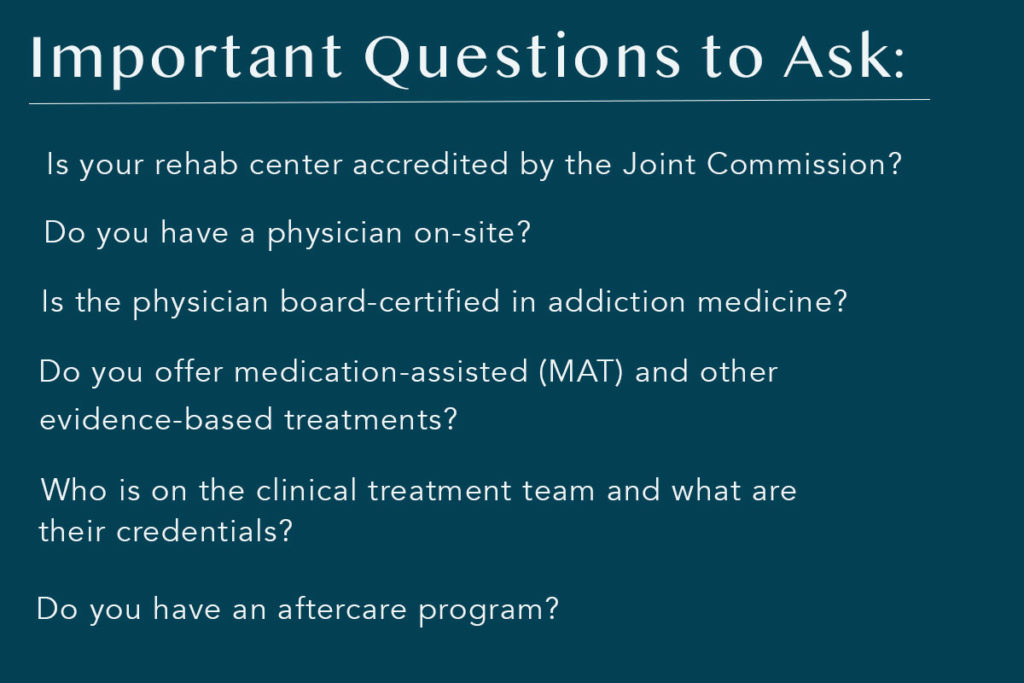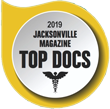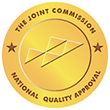When choosing a drug and alcohol rehab center for you or a loved one, the options can be overwhelming. With the spotlight on the opioid epidemic, the addiction medicine field has experienced massive growth. While selecting a rehab can seem difficult, there are excellent treatment centers where men and women are successfully recovering from substance use disorders.
So what should you look for when choosing a rehab for alcohol or drug addiction treatment near you? Here are tips to help you consider your options and decide on the best rehab to meet your treatment needs.

One: Is the rehabilitation center licensed and accredited?
In the state of Florida, the Department of Children and Families (DCF) oversees state licensing requirements for alcohol and drug rehab centers. While all rehabs in Florida must meet state licensing requirements to operate, some alcohol and drug treatment centers take the additional, voluntary step of seeking accreditation by one of two organizations: the Joint Commission or the Commission on Accreditation of Rehabilitation Facilities (CARF).
Both CARF and the Joint Commission are independent, nonprofit regulatory agencies that grant accreditation to drug rehab centers that demonstrate high quality care and a commitment to continuously seeking ways to improve the quality of care offered and provide treatment according to industry standards. Accreditation by either CARF or the Joint Commission is a sign that the rehab center is reputable and the staff meets high standards of care.
To receive Joint Commission behavioral healthcare accreditation, addiction treatment centers must meet rigorous standards related to quality and safety, treatment and operations. To receive Joint Commission accreditation, rehabs must undergo an evaluation by experts that provides impartial evidence of the quality of care, treatment or services. Recovery Keys proudly displays our Joint Commission Gold Seal of Approval™ for Behavioral Healthcare demonstrating our commitment to providing quality treatment.
Two. What are the credentials for the team of physicians, counselors and therapists?
One of the most important elements of an addiction treatment center is the clinical staff who will provide medical care, addiction counseling and ongoing support as you progress in your recovery from detox to aftercare. When seeking treatment, inquire about the treatment team and their credentials to ensure they have the training and experience to provide the best clinical care. You should also look for a multidisciplinary team approach that addresses all aspects of the disease of addiction and provides a mixture of professionals working together to create an individualized treatment plan for you or your loved one. The core treatment team may consist of the following professionals:
- Medical Doctor (MD) – Choose a rehab with a physician who is board-certified in addiction medicine through the American Board of Addiction Medicine (ABAM), the American Board of Preventive Medicine – Addiction Medicine (ABPM-ADM) or who is an addiction psychiatrist. This indicates they have had extensive training in the field of addiction medicine and can safely and effectively treat the disease of addiction. Addiction medicine physicians typically conduct thorough assessments at the outset of treatment, create treatment plans that take into consideration all of the physical and psychological conditions that can impact the course of addiction treatment, and can prescribe medication-assisted treatment (MAT).
- Primary Therapist – Make sure the therapists treating you are licensed professionals, which typically indicates they have a master’s degree. Therapists may have credentials such as Licensed Clinical Social Worker (LCSW), Licensed Marriage and Family Therapist (LMFT) or a Licensed Mental Health Counselor (LMHC).
- Addiction Counselor – Addiction counselors play an integral role in ensuring patients receive the support and education needed to avoid relapse, learn to recognize triggers, and develop life skills to maintain sobriety and achieve their goals in recovery. In Florida, addiction counselor credentials may be indicated as a Certified Addictions Specialist (CAC) or Certified Addiction Professional (CAP). Certified Alcohol and Drug Abuse Counselor (CADC) is another credential you may see. Since each state has its own licensing rules for addiction counselors, outside of Florida you may see other addiction counseling credentials, such as Licensed Alcohol and Drug Counselor (LADC). You may also have recovery support specialists working in the counseling department that are working on further credentials and are currently Certified Recovery Support Specialists (CRSS) or Certified Recovery Coaches (CRC).
- Holistic practitioners – Drug and alcohol addiction often leads people to neglect many aspects of their health, including eating well and exercising. Drug and alcohol rehabs may have experts in nutrition, yoga, meditation, exercise, recreation therapy and other holistic treatment modalities to help individuals restore physical well-being, learn relaxation techniques, and discover new ways of having fun in sobriety.
Three: Do they offer evidence-based practices for treatment?
Researchers are continually learning more about which approaches to drug and alcohol addiction treatment have the greatest odds for long-term success. The best rehabs incorporate these evidence-based practices into treatment. Evidence-based practices have been researched and scientifically proven to treat the disease of addiction.
Evidence-based treatments can include the use of medications such as buprenorphine (Suboxone) or naltrexone to curb cravings and reduce the risk of relapse in opioid addiction; nicotine-replacement therapies to help people quit smoking tobacco; and various medications that can help with withdrawal and abstaining from alcohol.
To work best, research shows that medication-assisted treatment (MAT) should be combined with evidence-based behavioral treatment. Examples include 12-Step facilitation therapy, cognitive behavioral therapy (CBT), dialectical behavioral therapy (DBT), motivational enhancement therapy, and interactive journaling.
Four: Do they offer aftercare for relapse prevention?
During alcohol and drug rehab, men and women get sober, build a foundation for sobriety, and begin to heal. But the work isn’t done after drug and alcohol addiction treatment is complete. In recovery, individuals benefit from ongoing support from addiction counselors and sober peers. This sober support system provides guidance and friendship, continues to provide assistance with developing sober living skills, and can provide help in overcoming challenges that crop up in life that could lead to relapse.
The best rehabs have aftercare programs that provide continued support to men and women in recovery, so that they have the social and therapeutic connections shown to help in maintaining sobriety over the long-term.



















